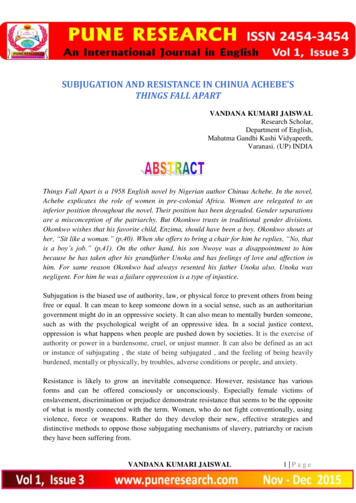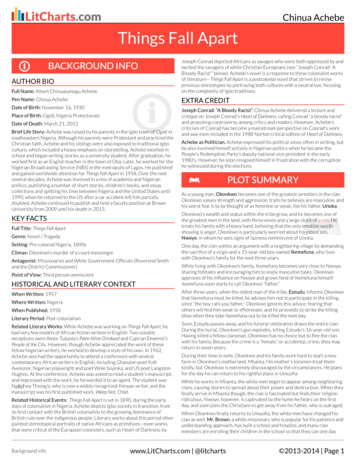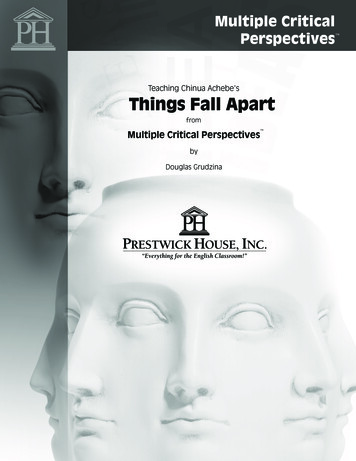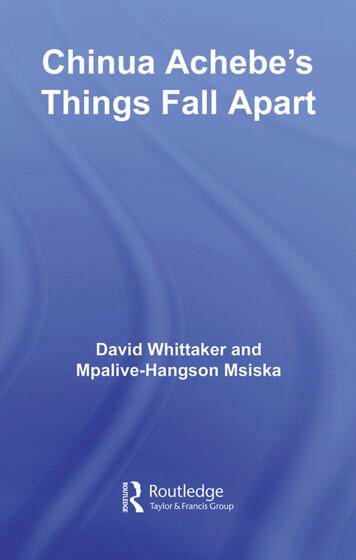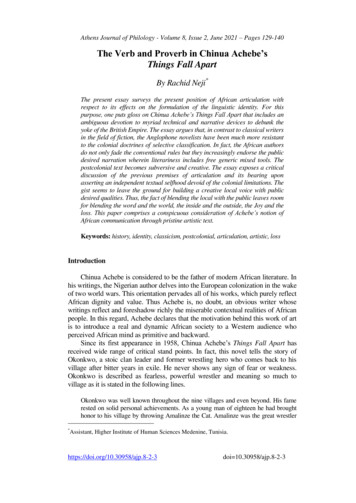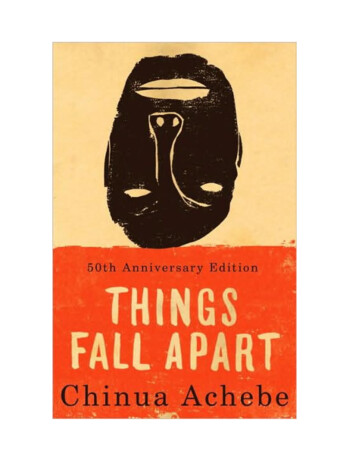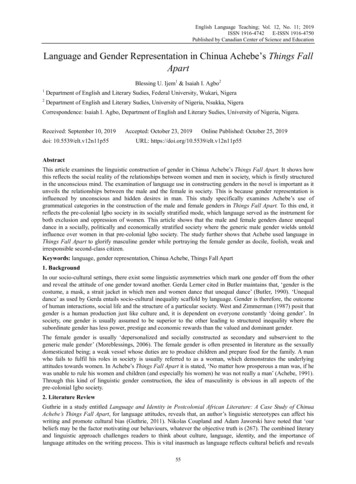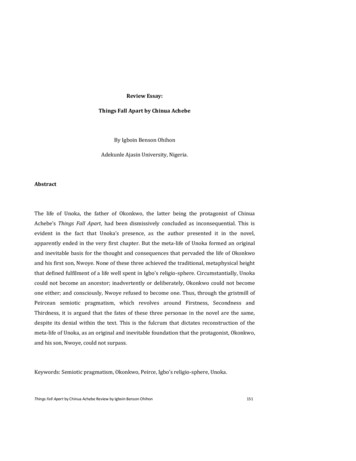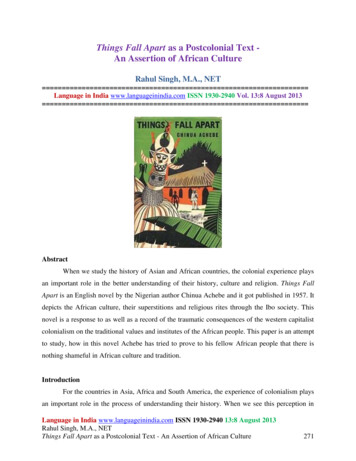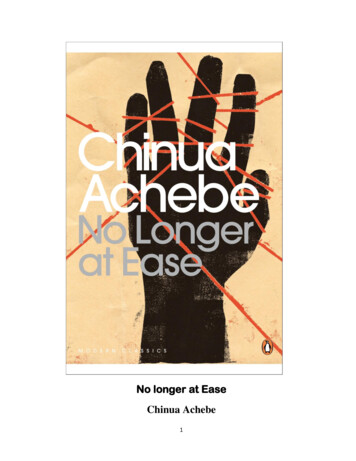
Transcription
No longer at EaseChinua Achebe1
No Longer at EaseFirst published in 19601For Christie2
We returned to our places, these Kingdoms,But no longer at ease here, in the old dispensation,With an alien people clutching their gods.I should be glad of another death.T. S. Eliot : 'The Journey of the Magi'.3
CHAPTER ONEFor three or four weeks Obi Okonkwo had been steeling himself against thismoment. And when he walked into the dock that morning he thought he was fullyprepared. He wore a smart palm-beach suit and appeared unruffled andindifferent. The proceeding seemed to be of little interest to him. Except for onebrief moment at the very beginning when one of the counsel had got into troublewith the judge.'This court begins at nine o'clock. Why are you late?'Whenever Mr Justice William Galloway, Judge of the High Court of Lagos andthe Southern Cameroons, looked at a victim he fixed him with his gaze as acollector fixes his insect with formalin. He lowered his head like a charging ramand looked over his gold-rimmed spectacles at the lawyer.'I am sorry, Your Honour,' the man stammered. 'My car broke down on the way.'The judge continued to look at him for a long time. Then he said very abruptly:'All right, Mr Adeyemi. I accept your excuse. But I must say I'm getting sick andtired of these constant excuses about the problem of locomotion.'There was suppressed laughter at the bar. Obi Okonkwo smiled a wan and ashysmile and lost interest again.Every available space in the court-room was taken up. There were almost as manypeople standing as sitting. The case had been the talk of Lagos for a number ofweeks and on this last day anyone who could possibly leave his jobwas there to hear the judgement. Some Civil Servants paid as much as tenshillings and sixpence to obtain a doctor's certificate of illness for the day.Obi's listlessness did not show any signs of decreasing even when the judge beganto sum up. It was only when he said: 'I cannot comprehend how a young man ofyour education and brilliant promise could have done this' that a sudden andmarked change occurred. Treacherous tears came into Obi's eyes. He brought outa white handkerchief and rubbed his face. But he did it as people do when theywipe sweat. He even tried to smile and belie the tears. A smile would have beenquite logical. All that stuff about education and promise and betrayal had nottaken him unawares. He had expected it and rehearsed this very scene a hundredtimes until it had become as familiar as a friend.4
In fact, some weeks ago when the trial first began, Mr Green, his boss, who wasone of the Crown witnesses, had also said something about a young man of greatpromise. And Obi had remained completely unmoved. Mercifully he had recentlylost his mother, and Clara had gone out of his life. The two events followingclosely on each other had dulled his sensibility and left him a different man, ableto look words like 'education' and 'promise' squarely in the face. But now whenthe supreme moment came he was betrayed by treacherous tears.Mr Green had been playing tennis since five o'clock. It was most unusual. As arule his work took up so much of his time that he rarely played. His normalexercise was a short walk in the evenings. But today he had played with a friendwho worked for the British Council. After the game they retired to the club bar.Mr Green had a light- yellow sweater over his white shirt, and a white towel hungfrom his neck. There were many other Europeans in the bar, some half-sitting onthe high stools and some standing in groups of twos and threes drinking cold beer,orange squash or gin-and-tonic.'I cannot understand why he did it,' said the British Council man thoughtfully. Hewas drawing lines of water with his finger on the back of his mist-covered glass ofice- cold beer.'I can,' said Mr Green simply. 'What I can't understand is why people like yourefuse to face facts.' Mr Green was famous for speaking his mind. He wiped hisred face with the white towel on his neck. 'The African is corrupt through andthrough.' The British Council man looked about him furtively, more from instinctthan necessity, for although the club was now open to them technically, fewAfricans went to it. On this particular occasion there was none, except of coursethe stewards who served unobtrusively. It was quite possible to go in, drink, sign acheque, talk to friends and leave again without noticing these stewards in theirwhite uniforms. If everything went right you did not see them.'They are all corrupt,' repeated Mr Green. 'I'm all for equality and all that. I for onewould hate to live in South Africa. But equality won't alter facts.''What facts?' asked the British Council man, who was relatively new to thecountry. There was a lull in the general conversation, as many people were nowlistening to Mr Green without appearing to do so.'The fact that over countless centuries the African has been the victim of the worstclimate in the world and of every imaginable disease. Hardly his fault. But he hasbeen sapped mentally and physically. We have brought him Western education.But what use is it to him? He is .'5
He was interrupted by the arrival of another friend.'Hello, Peter. Hello, Bill.''Hello.''Hello.''May I join you?''Certainly.''Most certainly. What are you drinking? Beer? Right. Steward. One beer for thismaster.''What kind, sir?''Heineken.''Yes, sir.''We were talking about this young man who took a bribe.''Oh yes.'Somewhere on the Lagos mainland the Umuofia Progressive Union was holdingan emergency meeting. Umuofia is an Ibo village in Eastern Nigeria and the hometown of Obi Okonkwo. It is not a particularly big village but its inhabitants call ita town. They are very proud of its past when it was the terror of their neighbours,before the white man came and levelled everybody down. Those Umuofians (thatis the name they call themselves) who leave their home town to find work intowns all over Nigeria regard themselves as sojourners. They return to Umuofiaevery two years or so to spend their leave. When they have saved up enoughmoney they ask their relations at home to find them a wife, or they build a 'zinc'house on their family land. No matter where they are in Nigeria, they start a localbranch of the Umuofia Progressive Union.In recent weeks the Union had met several times over Obi Okonkwo's case. At thefirst meeting, a handful of people had expressed the view that there was no reasonwhy the Union should worry itself over the troubles of a prodigal son who hadshown great disrespect to it only a little while ago.6
'We paid eight hundred pounds to train him in England,' said one of them. 'Butinstead of being grateful he insults us because of a useless girl. And now we arebeing called together again to find more money for him. What does he do with hisbig salary? My own opinion is that we have already done too much for him.'This view, although accepted as largely true, was not taken very seriously. For, asthe President pointed out, a kinsman in trouble had to be saved, not blamed; angeragainst a brother was felt in the flesh, not in the bone. And so the Union decidedto pay for the services of a lawyer from their funds.But this morning the case was lost. That was why another emergency meeting hadbeen convened. Many people had already arrived at the house of the President onMoloney Street, and were talking excitedly about the judgement.'I knew it was a bad case,' said the man who had opposed the Union's interventionfrom the start. 'We are just throwing money away. What do our people say? Hethat fights for a ne'er-do-well has nothing to show for it except a head covered inearth and grime.'But this man had no following. The men of Umuofia were prepared to fight to thelast. They had no illusions about Obi. He was, without doubt, a very foolish andself- willed young man. But this was not the time to go into that. The fox must bechased away first; after that the hen might be warned against wandering into thebush.When the time for warning came the men of Umuofia could be trusted to give it infull measure, pressed down and flowing over. The President said it was a thing ofshame for a man in the senior service to go to prison for twenty pounds. Herepeated twenty pounds, spitting it out. 'I am against people reaping where theyhave not sown. But we have a saying that if you want to eat a toad you shouldlook for a fat and juicy one.''It is all lack of experience,' said another man. 'He should not have accepted themoney himself. What others do is tell you to go and hand it to their houseboy. Obitried to do what everyone does without finding out how it was done.' He told theproverb of the house rat who went swimming with his friend the lizard and diedfrom cold, for while the lizard's scales kept him dry the rat's hairy body remainedwet.The President, in due course, looked at his pocket-watch and announced that itwas time to declare the meeting open. Everybody stood up and he said a shortprayer. Then he presented three kola nuts to the meeting. The oldest man presentbroke one of them, saying another kind of prayer while he did it. 'He that bringskola nuts brings life,' he said. 'We do not seek to hurt any man, but if any manseeks to hurt us may he break his neck.' The congregation answered Amen . 'Weare strangers in this land. If good comes to it may we have our share.' Amen . 'But7
if bad comes let it go to the owners of the land who know what gods should beappeased.' Amen . 'Many towns have four or five or even ten of their sons inEuropean posts in this city. Umuofia has only one. And now our enemies say thateven that one is too many for us. But our ancestors will not agree to such a thing.'Amen . 'An only palm-fruit does not get lost in the fire.' Amen .Obi Okonkwo was indeed an only palm-fruit. His full name was Obiajulu---'themind at last is at rest'; the mind being his father's of course, who, his wife havingborne him four daughters before Obi, was naturally becoming a little anxious.Being a Christian convert---in fact a Catechist---he could not marry a second wife.But he was not the kind of man who carried his sorrow on his face. In particular,he would not let the heathen know that he was unhappy. He had called his fourthdaughter Nwanyidinma---'a girl is also good'. But his voice did not carryconviction.The old man who broke the kola nuts in Lagos and called Obi Okonkwo an onlypalm-fruit was not, however, thinking of Okonkwo's family. He was thinking ofthe ancient and war-like village of Umuofia. Six or seven years ago Umuofiansabroad had formed their Union with the aim of collecting money to send some oftheir brighter young men to study in England. They taxed themselves mercilessly.The first scholarship under this scheme was awarded to Obi Okonkwo five yearsago, almost to the day. Although they called it a scholarship it was to be repaid. InObi's case it was worth eight hundred pounds, to be repaid within four years of hisreturn. They wanted him to read law so that when he returned he would handle alltheir land cases against their neighbours. But when he got to England he readEnglish; his self-will was not new. The Union was angry but in the end they lefthim alone. Although he would not be a lawyer, he would get a 'European post' inthe Civil Service.The selection of the first candidate had not presented any difficulty to the Union.Obi was an obvious choice. At the age of twelve or thirteen he had passed hisStandard Six examination at the top of the whole province. Then he had won ascholarship to one of the best secondary schools in Eastern Nigeria. At the end offive years he passed the Cambridge School Certificate with distinction in all eightsubjects. He was in fact a village celebrity, and his name was regularly invoked atthe mission school where he had once been a pupil. (No one mentioned nowadaysthat he once brought shame to the school by writing a letter to Adolf Hitler duringthe war. The headmaster at the time had pointed out, almost in tears, that he was adisgrace to the British Empire, and that if he had been older he would surely havebeen sent to jail for the rest of his miserable life. He was only eleven then, and sogot off with six strokes of the cane on his buttocks.)Obi's going to England caused a big stir in Umuofia. A few days before hisdeparture to Lagos his parents called a prayer meeting at their home. TheReverend Samuel Ikedi of St Mark's Anglican Church, Umuofia, was chairman.He said the occasion was the fulfilment of the prophecy:8
'The people which sat in darknessSaw a great light,And to them which sat in the region and shadow of deathTo them did light spring up.'He spoke for over half an hour. Then he asked that someone should lead them inprayer. Mary at once took up the challenge before most people had had time tostand up, let alone shut their eyes. Mary was one of the most zealous Christians inUmuofia and a good friend of Obi's mother, Hannah Okonkwo. Although Marylived a long way from the church---three miles or more---she never missed theearly morning prayer which the pastor conducted at cockcrow. In the heart of thewet season, or the cold harmattan.Mary was sure to be there. Sometimes she came as much as an hour before time.She would blow out her hurricane lamp to save kerosene and go to sleep on thelong mud seats.'Oh God of Abraham, God of Isaac and God of Jacob,' she burst forth, 'theBeginning and the End. Without you we can do nothing. The great river is not bigenough for you to wash your hands in. You have the yam and you have the knife;we cannot eat unless you cut us a piece. We are like ants in your sight. We are likelittle children who only wash their stomach when they bath, leaving their back dry.' She went on and on reeling off proverb after proverb and painting picture afterpicture. Finally, she got round to the subject of the gathering and dealt with it asfully as it deserved, giving among other things, the life history of her friend's sonwho was about to go to the place where learning finally came to an end. When shewas done, people blinked and rubbed their eyes to get used to the evening lightonce more.They sat on long wooden forms which had been borrowed from the school. Thechairman had a little table before him. On one side sat Obi in his school blazer andwhite trousers.Two stalwarts emerged from the kitchen area, half bent with the gigantic iron potof rice which they carried between them. Another pot followed. Two youngwomen then brought in a simmering pot of stew hot from the fire. Kegs of palmwine followed, and a pile of plates and spoons which the church stocked for theuse of its members at marriages, births, deaths and other occasions such as this.Mr Isaac Okonkwo made a short speech placing 'this small kola' before his guests.By Umuofia standards he was well-to-do. He had been a catechist of the ChurchMissionarySociety for twenty-five years and then retired on a pension of twenty-five poundsa year. He had been the very first man to build a 'zinc' house in Umuofia. It was9
therefore not unexpected that he would prepare a feast. But no one had imaginedanything on this scale, not even from Okonkwo who was famous for his openhandedness which sometimes bordered on improvidence. Whenever his wiferemonstrated against his thriftlessness he replied that a man who lived on thebanks of the Niger should not wash his hands with spittle---a favourite saying ofhis father's. It was odd that he should have rejected everything about his fatherexcept this one proverb. Perhaps he had long forgotten that his father often used it.At the end of the feast the pastor made another long speech. He thanked Okonkwofor giving them a feast greater than many a wedding feast these days.Mr Ikedi had come to Umuofia from a township, and was able to tell the gatheringhow wedding feasts had been steadily declining in the towns since the inventionof invitation cards. Many of his hearers whistled in unbelief when he told themthat a man could not go to his neighbour's wedding unless he was given one ofthese papers on which they wrote R.S.V.P.---Rice and Stew Very Plenty---whichwas invariably an over-statement.Then he turned to the young man on his right. 'In times past,' he told him,'Umuofia would have required of you to fight in her wars and bring home humanheads. But those were days of darkness from which we have been delivered by theblood of the Lamb of God. Today we send you to bring knowledge. Rememberthat the fear of the Lord is the beginning of wisdom. I have heard of young menfrom other towns who went to the white man's country, but instead of facing theirstudies they went after the sweet things of the flesh. Some of them even marriedwhite women.' The crowd murmured its strong disapproval of such behaviour. 'Aman who does that is lost to his people. He is like rain wasted in the forest. Iwould have suggested getting you a wife before you leave. But the time is tooshort now. Anyway, I know that we have no fear where you are concerned. Weare sending you to learn book. Enjoyment can wait. Do not be in a hurry to rushinto the pleasures of the world like the young antelope who danced herself lamewhen the main dance was yet to come.'He thanked Okonkwo again, and the guests for answering his call. 'If you had notanswered his call, our brother would have become like the king in the Holy Bookwho called a wedding feast.'As soon as he had finished speaking, Mary raised a song which the women hadlearnt at their prayer meeting.'Leave me not behind Jesus, wait for meWhen I am going to the farm.Leave me not behind Jesus, wait for me10
When I am going to the market.Leave me not behind Jesus, wait for meWhen I am eating my food.Leave me not behind Jesus, wait for meWhen I am having my bath.Leave me not behind Jesus, wait for meWhen he is going to the White Man's Country.Leave him not behind Jesus, wait for him.'The gathering ended with the singing of 'Praise God from whom all blessingsflow'. The guests then said their farewells to Obi, many of them repeating all theadvice that he had already been given. They shook hands with him and as they didso they pressed their presents into his palm, to buy a pencil with, or an exercisebook or a loaf of bread for the journey, a shilling there and a penny there --substantial presents in a village where money was so rare, where men and womentoiled from year to year to wrest a meagre living from an unwilling and exhaustedsoil.11
CHAPTER TWOObi was away in England for a little under four years. He sometimes found itdifficult to believe that it was as short as that. It seemed more like a decade thanfour years, what with the miseries of winter when his longing to return home tookon the sharpness of physical pain. It was in England that Nigeria first becamemore than just a name to him. That was the first great thing that England did forhim.But the Nigeria he returned to was in many ways different from the picture he hadcarried in his mind during those four years. There were many things he could nolonger recognise, and others---like the slums of Lagos--- which he was seeing forthe first time.As a boy in the village of Umuofia he had heard his first stories about Lagos froma soldier home on leave from the war. Those soldiers were heroes who had seenthe great world. They spoke of Abyssinia, Egypt, Palestine, Burma and so on.Some of them had been village ne'er-do-wells, but now they were heroes. Theyhad bags and bags of money, and the villagers sat at their feet to listen to theirstories. One of them went regularly to a market in the neighbouring village andhelped himself to whatever he liked. He went in full uniform, breaking the earthwith his boots, and no one dared touch him. It was said that if you touched asoldier, Government would deal with you. Besides, soldiers were as strong aslions because of the injections they were given in the army. It was from one ofthese soldiers that Obi had his first picture of Lagos.'There is no darkness there,' he told his admiring listeners, 'because at night theelectric shines like the sun, and people are always walking about, that is, thosewho want to walk. If you don't want to walk you only have to wave your hand anda pleasure car stops for you.' His audience made sounds of wonderment. Then byway of digression he said: 'If you see a white man, take off your hat for him. Theonly thing he cannot do is mould a human being.'For many years afterwards, Lagos was always associated with electric lights andmotor-cars in Obi's mind. Even after he had at last visited the city and spent a fewdays there before flying to the United Kingdom his views did not change verymuch. Of course, he did not really see much of Lagos then. His mind was, as itwere, on higher things. He spent the few days with his 'country-man', JosephOkeke, a clerk in the Survey Department. Obi and Joseph had been class-mates atthe Umuofia C.M.S. Central School. But Joseph had not gone on to a secondaryschool because he was too old and his parents were poor. He had joined theEducation Corps of the 82nd Division and, when the war ended, the clericalservice of the Nigerian Government.12
Joseph was at Lagos Motor Park to meet his lucky friend who was passingthrough Lagos to the United Kingdom. He took him to his lodgings in Obalende.It was only one room. A curtain of light-blue cloth ran the full breadth of the roomseparating the Holy of Holies (as he called his double spring bed) from the sittingarea. His cooking utensils, boxes and other personal effects were hidden awayunder the Holy of Holies. The sitting area was taken up with two armchairs, asettee (otherwise called 'me and my girl') and a round table on which he displayedhis photo album. At night, his houseboy moved away the round table and spreadhis mat on the floor.Joseph had so much to tell Obi on his first night in Lagos that it was past threewhen they slept. He told him about the cinema and the dance halls and aboutpolitical meetings.'Dancing is very important nowadays. No girl will look at you if you can't dance. Ifirst met Joy at the dancing school.' 'Who is Joy?' asked Obi who was fascinatedby what he was learning of this strange and sinful new world. 'She was my girlfriend for---let's see. .' he counted off his fingers '. March, April, May, June,July---for five months. She made these pillow-cases for me.'Obi raised himself instinctively to look at the pillow he was lying on. He hadtaken particular notice of it earlier in the day. It had the strange word OSCULATEsewn on it, each letter in a different colour.'She was a nice girl but sometimes very foolish. Sometimes, though, I wish wehadn't broken up. She was simply mad about me; and she was a virgin when I mether, which is very rare here.'Joseph talked and talked and finally became less and less coherent. Then withoutany pause at all his talk was transformed into a deep snore which continued untilthe morning.The very next day Obi found himself taking a compulsory walk down LewisStreet. Joseph had brought a woman home and it was quite clear that Obi'spresence in the room was not desirable; so he went out to have a look round. Thegirl was one of Joseph's new finds, as he told him later. She was dark and tall withan enormous pneumatic bosom under a tight-fitting red and yellow dress.Her lips and long finger-nails were a brilliant red, and her eyebrows were fineblack lines. She looked not unlike those wooden masks made in Ikot Ekpene.Altogether she left a nasty taste in Obi's mouth, like the multi-coloured wordOSCULATE on the pillow-case.13
Some years later as Obi, newly returned from England, stood beside his car atnight in one of the less formidable of Lagos slum areas waiting for Clara to takeyards of material to her seamstress, his mind went over his earlier impressions ofthe city. He had not thought places like this stood side by side with the cars,electric lights and brightly dressed girls.His car was parked close to a wide-open storm drain from which came a verystrong smell of rotting flesh. It was the remains of a dog which had no doubt beenrun over by a taxi. Obi used to wonder why so many dogs were killed by cars inLagos, until one day the driver he had engaged to teach him driving went out ofhis way to run over one. In shocked amazement Obi asked why he had done it. 'Nagood luck,' said the man. 'Dog bring good luck for new car. But duck be different.If you kill duck you go get accident or kill man.'Beyond the storm drain there was a meat-stall. It was quite empty of meat ormeat-sellers. But a man was working a little machine on one of the tables. Itlooked like a sewing-machine except that it ground maize. A woman stood bywatching the man turn the machine to grind her maize.On the other side of the road a little boy wrapped in a cloth was selling bean cakesor akara under a lamp-post. His bowl of akara was lying in the dust and heseemed half asleep. But he really wasn't, for as soon as the night-soil-man passedswinging his broom and hurricane lamp and trailing clouds of putrefaction the boyquickly sprang to his feet and began calling him names. The man made for himwith his broom but the boy was already in flight, his bowl of akara on his head.The man grinding maize burst into laughter, and the woman joined in. The nightsoil- man smiled and went his way, having said something very rude about theboy's mother.Here was Lagos, thought Obi, the real Lagos he hadn't imagined existed untilnow. During his first winter in England he had written a callow, nostalgic poemabout Nigeria. It wasn't about Lagos in particular, but Lagos was part of theNigeria he had in mind.'How sweet it is to lie beneath a treeAt eventime and share the ecstasyOf jocund birds and flimsy butterflies;How sweet to leave our earthbound body in its mud,And rise towards the music of the spheres,Descending softly with the wind,And the tender glow of the fading sun.'14
He recalled this poem and then turned and looked at the rotting dog in the stormdrain and smiled. 'I have tasted putrid flesh in the spoon,' he said through clenchedteeth. 'Far more apt.' At last Clara emerged from the side street and they droveaway.They drove for a while in silence through narrow overcrowded streets. 'I can'tunderstand why you should choose your dressmaker from the slums.' Clara didnot reply. Instead she started humming 'Che sarà sarà.'The streets were now quite noisy and crowded, which was to be expected on aSaturday night at nine o'clock. Every few yards one met bands of dancers oftenwearing identical dress or ' aso ebi '. Gay temporary sheds were erected in front ofderelict houses and lit with brilliant fluorescent tubes for the celebration of anengagement or marriage or birth or promotion or success in business or the deathof an old relative.Obi slowed down as he approached three drummers and a large group of youngwomen in damask and velvet swivelling their waists as effortlessly as oiled ballbearings. A taxi driver hooted impatiently and overtook him, leaning out at thesame time to shout: ' Ori oda , your head no correct!' ' Ori oda ---bloody fool!'replied Obi. Almost immediately a cyclist crossed the road without looking backor giving any signal. Obi jammed on his brakes and his tyres screamed on thetarmac. Clara let out a little scream and gripped his right arm. The cyclist lookedback once and rode away, his ambition written for all to see on his black bicyclebag---FUTURE MINISTER.Going from the Lagos mainland to Ikoyi on a Saturday night was like going froma bazaar to a funeral. And the vast Lagos cemetery which separated the two placeshelped to deepen this feeling. For all its luxurious bungalows and flats and itsextensive greenery, Ikoyi was like a graveyard. It had no corporate life---at anyrate for those Africans who lived there. They had not always lived there, ofcourse. It was once a European reserve. But things had changed, and someAfricans in 'European posts' had been given houses in Ikoyi. Obi Okonkwo, forexample lived there, and as he drove from Lagos to his flat he was struck again bythese two cities in one. It always reminded him of twin kernels separated by a thinwall in a palm-nut shell. Sometimes one kernel was shiny-black and alive, theother powdery-white and dead.'What is making you so moody?' He looked sideways at Clara who wasostentatiously sitting as far away from him as she could, pressed against the left15
door. She did not answer. 'Tell me, darling,' he said, holding her hand in one of hiswhile he drove with the other. 'Leave me, ojare ,' she said, snatching her handaway.Obi knew very well why she was moody. She had suggested in her tentative waythat they should go to the films. At this stage in their relationship, Clara neversaid: 'Let us go to films.' She said instead: 'There is a good film at the Capitol.'Obi, who did not care for films, especially those that Clara called good, had saidafter a long silence: 'Well, if you insist, but I'm not keen.' Clara did not insist, butshe felt very much hurt. All evening she had been nursing her feelings. 'It's not toolate to go to your film,' said Obi capitulating, or appearing to do so. 'You may goif you want to, I'm not coming,' she said. Only three days before they had gone tosee 'a very good film' which infuriated Obi so much that he stopped looking at thescreen altogether, except when Clara whispered one explanation or another for hisbenefit. 'That man is going to be killed,' she would prophesy, and sure as death,the doomed man would be shot almost immediately. From downstairs the shillingticket audience participated noisily in the action.It never ceased to amaze Obi that Clara should take so much delight in theseorgies of killing on the screen. Actually it rather amused him when he thought ofit outside the cinema. But while he was there he could feel nothing but annoyance.Clara was well aware of this, and tried her best to ease the tedium for him bysqueezing
3 We returned to our places, these Kingdoms, But no longer at ease here, in the old
